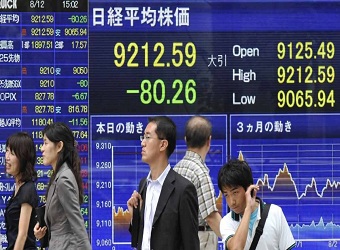Asian markets traded mixed on Wednesday, even after U.S. equities closed higher overnight.
In Japan, the Nikkei 225 gave up morning gains of more than 0.2 percent to trade down 0.07 percent at 20,600.03 in the afternoon. The Topix index also erased gains to trade down 0.14 percent.
Fast Retailing shares lost early gains of more than 1 percent to trade down 1.02 percent in the afternoon. The initial gains followed reports that said same-store sales at its Uniqlo retail outlets in the country rose 6.3 percent on-year in September.
Meanwhile, shares of Japan Display rose nearly 27 percent following a report from the Nikkei business daily that the company intends to begin mass production of small OLED panels for smartphones as early as 2019.
Its affiliate, JOLED, has plans to begin printing midsize and large OLED panels for industrial equipment and televisions, Nikkei said.
The Japan business daily also said Japan Display began looking for a partner to split its smartphone panel investment, which is expected to be more than $1.77 billion.
Australian stocks slipped, with the benchmark ASX 200 lower by 49.34 points, or 0.87 percent, at 5,652.1.The energy subindex was down 1.09 percent and the heavily-weighted financial sector fell 0.71 percent.
Major Australian banking stocks were mostly lower, with ANZ shares shedding 2.11 percent, Westpac off 0.87 percent and the National Australia Bank lower by 1.21 percent. Commonwealth Bank shares bucked the downtrend and rose 0.32 percent.
Markets in China and South Korea remain closed for public holidays.
Meanwhile, the Reserve Bank of India’s (RBI) monetary policy decision was due on Wednesday. Many analysts expect the central bank to stay on hold, keeping the repo rate at six percent.
A Reuters poll found that many economists said the central bank may downgrade its growth forecast following the implementation of the new goods and services tax in the country.
“There is pressure on the committee to ease rates, given that the repo rate is at 6 percent versus below 4 percent CPI inflation,” said Radhika Rao, an economist at Singapore-based DBS Bank, in a note. “The RBI is, however, unlikely to react this week as besides a gradual rise in inflation, significant changes in the macro backdrop also need to be assessed further.”
Meanwhile, economists at Bank of America Merrill Lynch said in a note that they expect a 25-basis-point rate cut from the RBI in December on “weak growth” and “reasonable 4.5 percent” first half 2018 inflation. The central bank’s target inflation range is between 2 and 6 percent.
The Indian rupee will be in focus. The currency last fetched 65.35 per dollar, compared with levels above 65.8 reached in the previous week.
Elsewhere in the currency market, the dollar index, which measures the greenback against a basket of currencies, traded at 93.369, slipping from yesterday’s levels near 93.600.
Meanwhile, the Japanese yen traded at 112.49 per dollar, strengthening from levels near 113.1 in the previous session.
“There wasn’t much consistency in the performance of the dollar and while dollar/yen failed to end the day above 113, it also did not experience significant losses,” Kathy Lien, managing director of foreign exchange strategy for BK Asset Management, said in an early morning note, referring to overnight moves in the foreign exchange market.
Lien said the dollar’s “quiet strength suggests that investors are optimistic and it’s hard not to be with stocks hitting fresh record highs Monday and Tuesday.”
The Australian dollar, for its part, climbed from levels near $0.78 in the last session to trade at $0.7862 on Wednesday late morning.
Oil prices traded lower, with U.S. crude down 0.63 percent at $50.1 a barrel. Global benchmark Brent fell 0.48 percent to $55.73.
Source: CNBC


